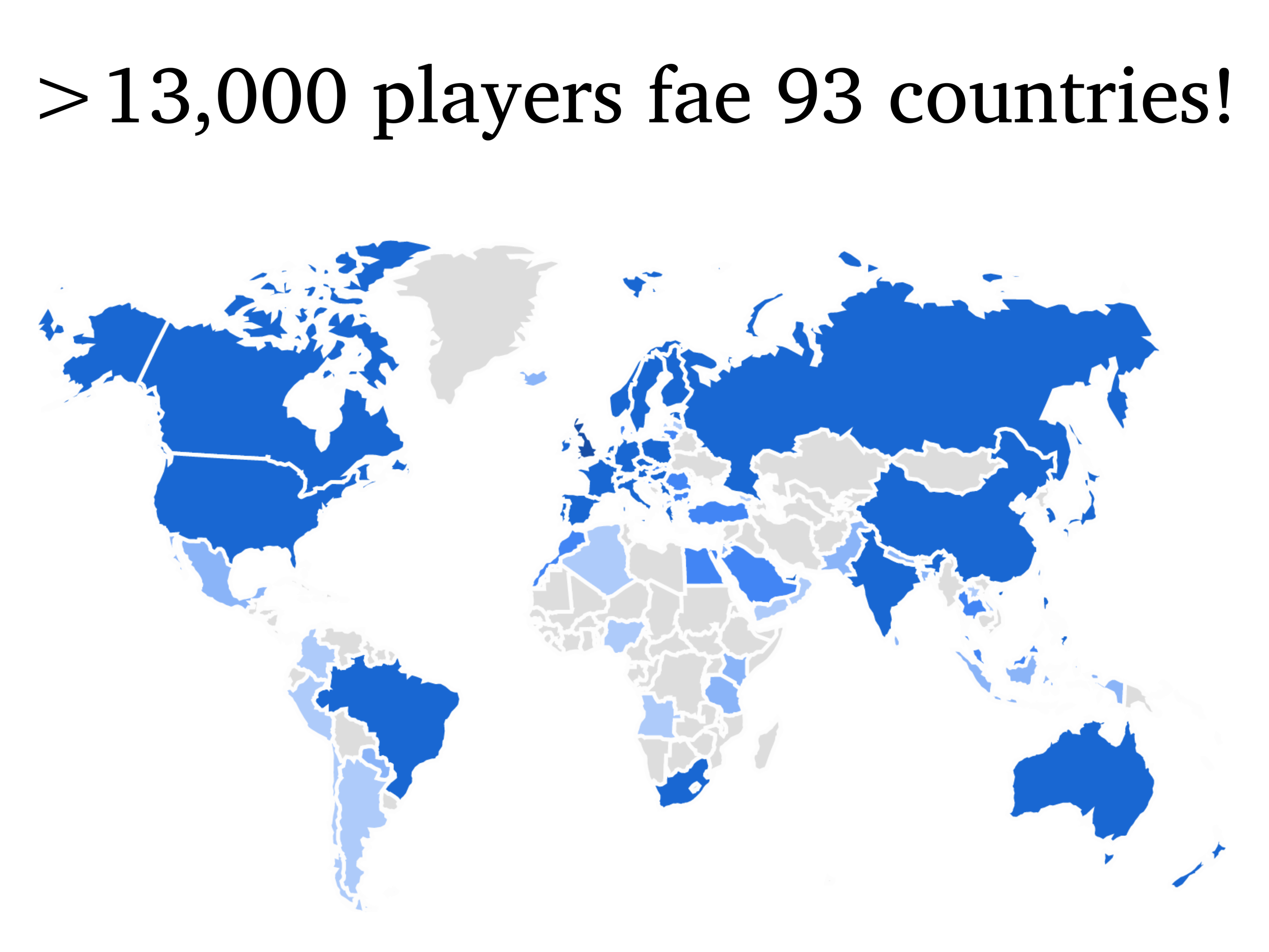Wirdle solutions week 12
W'ir blyde tae announce dat, as o daday, da Shaetlan Wirdle is haed mair as 13,000 players fae 93 countries. Here's da solutions fir dis week! Scroll fir ee wird at a time tae git da richt answer, it's meaneen, an da history o da wird. Last you'll fin da main references at we øse fir da etymologies, an da latest map o players. You'll fin da priciples o wir spelleen system at https://wwwiheardee.com/shaetlan/spellin-in-shaetlan (or inna wir linktree).
✅
Hit's important tae mind at "Aald English" wis nivver a monolithic language, reider hit's a cover term fir fower distinct Nort Sea Germanic varieties. Da direct ancestor tae Scots wis Northumbrian Aald English. Da direct ancestor tae English wis Mercian Old English. But maist o whit data is left comes fae Wast Saxon Aald English. Wharivver possible w'ir gien da Northumbrian Aald English forms, seein as da main ancestors tae Shaetlan is Norn an Scots (no English), wi a lok o Dutch/Low German influence.
✅
Wir tanks agein tae Julie fir tinkin up da idee, an tae Andrew fir makkin it possible! 🤗
flans plural o flan ‘swap; sudden blaaeen o wind’
History: da Aald Scots flan ‘a blast’ is attestit fae c.1475. Hit comes fae Aald Norse flana ‘tae be in a skrit, tae flee aboot’ (an hit’s still fun idda Scandinavian languages, laek Da. flane ‘id.’ Sw. flana ‘flee aboot; be filkset, play da fül’). Da Aald Norse verb cam intae Norman as flan(n)er at’s da origin o da French flâner ‘tae drittel, hing aboot, etc’. Hit ultimately derives fae da Proto-Indo-European *pleh₂- ‘flat, broad’.
yoags plural o yoag ‘horse mussel’
History: dis wird is onny fun in Orkney an Shetland. Hit comes fae da Aald Norse aða ‘yoag’, at’s still fun athin Icel. aða, Far. øðuskel, No. oskjell (aa meanin ‘yoag’). Ony ferder etymology isna kent o.
greth ‘urine’
History: da Aald Scots gra(i)th(e), gre(a)th ‘tae mak reidy (in various wyes)’ comes fae Aald Norse greiða ‘tae mak reidy, arreinge, etc’, at in turn comes fae Proto-Germanic *garaidijaną ‘tae mak reidy, arreinge’, ultimately fae da Proto-Indo-European røt *h₂rey- ‘tae coont, oarder’. Here da semantic shift seems tae a geen fae ‘mak reidy’ tae ‘steep/wysh in urine’ tae jüst ‘urine’.
parks plural o park ‘field’
History: da Aald Scots park comes fae Aald French parc ‘livestock crø’, at in turn comes fae Medieval Latin par(ri)cus ‘fenced in enclosure; game park; fence’. Dat in turn is a lonn fae Frankish *parrik/parruk ‘enclosure, crø’ at comes fae Proto-Germanic *parrukaz ‘enclosure, fence’. But ony ferder etymology isna kent o. Da meaneen ‘a enclosed bit o grund fir grazeen or cultivation; a rig, toon’ is attestit fae 1393, but is noo mainly fun atidda nort English an Scots varieties.
graav ‘boddam o da sea, esp. sediment apø da boddam o da sea’
History: dis wis wint tae be a fisherman’s taboo wird at’s come intae da general lexicon wi its taboo wird meaneen. Da original meaneen wis ‘grave’, at’s a pan-Germanic wird. Aald Scots gra(i)f(fe), greaf (a grave, tomb’ is attestit fae 1400. Hit comes fae Aald English græf ‘grave’ at comes fae Proto-Germanic *grabą ‘grave’. Dat itsel is a nominal derivation o *grabaną ‘tae dig’, at ultimately comes fae da Proto-Indo-European *gʰrebʰ- ‘tae dig, kloor, scraep’.
traep ‘tae nivver aise erguin; tell aff, flite apün’
History: da Aald Scots threip ‘ergument’ micht be attestit as airly as 1296. Hit comes fae Aald English þrēapian ‘tae flite apün, tell aff’, at comes fae Proto-Germanic *þrawō ‘tirmenteen, suffereen’ an is a nominal derivation o *þrawjaną ‘tae tirment, hurt, tire oot’ at in turn comes fae Proto-Indo-European *trouH-eh₁- ‘to baet, hurt, kill, tirment’ Noo hit’s mainly fun idda nort dialects an athin Scots.
vexed ‘pitten oot, upset’, past participle o vex ‘tae pit oot, distress, disappoint’
History: da Aald Scots vex ‘tae fret’ is attestit fae ca 1500. Hit’s a lonn fae Aald French vexer ‘tae herm; tae hurt (espeecially trow torture)’, at derives fae Latin vexāre ‘tae harass, pit someen oot; budder (wi violence); persecute’. Hit ultimately comes fae da Proto-Indo-European røt *gʷog- ‘tae shak, swing’.
References
Bokmålsordboka. 2022. Språkrådet og Universitetet i Bergen. Available at http://ordbøkene.no.
Christie-Johnston, Alastair & Adaline Christie-Johnston. 2014. Shetland words. A dictionary of the Shetland dialect. Lerwick: The Shetland Times.
de Vaan, Michiel. 2008. Etymological dictionary of Latin and the other Italic languages. Leiden, Boston: Brill
de Vries, Jan. 1977. Altnordisches etymologisches Wörterbuch. Leiden: Brill.
DSL Online. 2002. Glasgow: The University of Glasgow. Available at https://dsl.ac.uk/.
Heggestad, Leiv, Finn Hødnebø & Erik Simensen. 1993. Norrøn ordbok. 4th edn of Gamalnorsk ordbok. Oslo: Det norske samlaget.
Hellquist, Elof. 1993. Svensk etymologisk ordbok. 3rd edn. 2 Vols. Malmö: Gleerups.
Jakobsen, Jakob. 1985 [1928]. An etymological dictionary of the Norn language in Shetland. Lerwick: The Shetland Times.
Kroonen, Guus. 2013. Etymological dictionary of Proto-Germanic. Leiden: Brill.
Lehmann, Winfred P. 1986. A Gothic etymological dictionary. Leiden: Brill.
Macbain, Alexander. 1911. An etymological dictionary of the Gaelic language. Stirling: Eneas Mackay.
Marwick, Hugh. 1929. The Orkney Norn. Oxford: Oxford University Press.
Matasović, Ranko. 2009. Etymological dictionary of Proto-Celtic. Leiden: Brill.
Nielsen, Niels Åge. 1995. Dansk etymologisk ordbog. Ordenes historie. 4th edn. København: Gyldendal.
Nynorskordboka. 2022. Språkrådet og Universitetet i Bergen. Available at http://ordbøkene.no.
OED Online. 2021. Oxford: Oxford University Press. Available at https://www-oed-com.ezproxy.uni-giessen.de.
Orel, Vladimir. 2003. A handbook of Germanic etymology. Leiden: Brill.
Pfeifer, Wolfgang (ed.). 1997. Etymologisches Wörterbuch des Deutschen. München: Deutscher Taschenbuch Verlag.
Pokorny, Julius. 1994. Indogermanisches etymologisches Wörterbuch. 3rd edn. 2 Vols. Tübingen: Francke Verlag.
Torp, Alf. 1919. Nynorsk etymologisk ordbok. Kristiania: Forlaget H. Aschehoug & Co.
Zoëga, Geir T. 1896. English-Icelandic dictionary. Reykjavík: Sigurður Kristjánsson.
Zoëga, Geir T. 1922. Icelandic-English dictionary. 2nd edn, enlarged. Reykjavík: Sigurður Kristjánsson.

